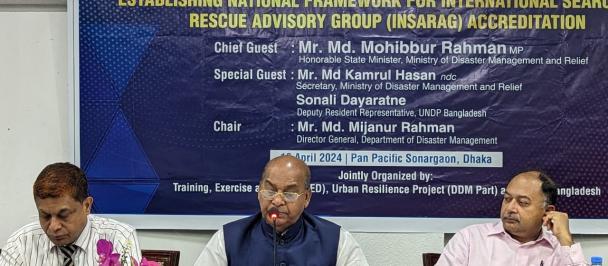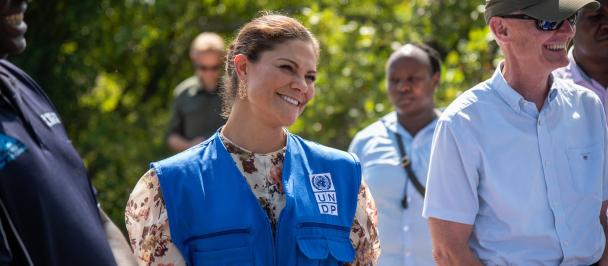By M M Zimran Khan, Head of Exploration, UNDP Bangladesh, Sohara Mehroze Shachi, Head of Solutions Mapping, UNDP Bangladesh, Ramiz Uddin, Head of Experimentation, UNDP Bangladesh, Wahid Hossain, Co-Founder, PathFinder, Ummey Honey Mim, Co-Founder, PathFinder
ACC-LAB
In the advent of the 4th Industrial Revolution and the “Gig Economy’” the world is witnessing a dramatic shift in what is desired in an employee and the creation of a new type of employee. The future requires the new generation to be equipped with novel skills such as ideation, problem framing, design thinking, prototyping, and social innovation, and as the world transitions increasingly into a virtual space demand will keep on rising for expertise in digital, virtual, and global collaboration, and cross-cultural competencies.

Naturally, the significance of entrepreneurship education and “entrepreneurial mindset” at the school level have become widely recognized in recent times. It has now become clear to parents and educators alike that today’s students need to be better prepared for the ever-evolving future of work. Developing knowledge among school children on entrepreneurship will help nurture an enterprising mindset
ultimately leading the students towards excellence in school and more importantly beyond the school years. But this is not an easy task as it requires delivering entrepreneurship education from an early age, advancing gradually through all levels of education in a meaningful and engaging way that would effectively instill a process of lifelong learning in students. A robust understanding of societal problems among youth and the role they can play in innovating and solving such problems starts with an entrepreneurial mindset. However, currently in schools across Bangladesh, especially in rural areas, the general focus is on preparing students for traditional university education rather than on the realities of life and the challenges and opportunities that the future may bring.
To that end, the UNDP Accelerator Lab Bangladesh joined hands with 'PathFinder’ - a unique, virtual cross-cultural educational platform that aims to educate K-12 level students including those from disadvantaged backgrounds. PathFinder program enlisted students from Bangladesh, the Philippines, India, Zambia, and Sweden. In September 2021, UNDP Accelerator Lab and the PathFinder team started working together to develop a multi-national program to introduce entrepreneurship education to the high-school students. The idea was to empower these students, unleash their creativity, encourage a mindset of abundance and self-determination, and promote purposeful entrepreneurial action. PathFinder would serve as a pathway for developing the values and skills around social entrepreneurship, community leadership, and for taking up the role of young leaders in local communities to build a better tomorrow. PathFinder’s goal is to create 250+ social change-makers in Bangladesh and around the globe by 2022 through an advanced curriculum designed to solve the challenges around Sustainable Development Goals (SDGs).
Before stepping into the primary cohort, which consists of 24 classes over a period of three months, PathFinder wanted to evaluate its program effectiveness. With that goal, a two-day Bootcamp was arranged to understand the curriculum approach for these students and engage local & global entrepreneurs, government bodies, and mentors to better collaborate in the actual PathFinder program. It was essential to understand how effectively the participants could engage and create cross-cultural bonding among the Bangladeshi, Filipino, Indian, Zambian & Swedish school students to identify the SDG challenges and approaches to solve them in their respective countries.
Keeping in line with this, UNDP Accelerator Lab Bangladesh and PathFinder approached and successfully engaged BeyondGrades, Siklab, Hara World, and Masambilo Research and Sustainability Action MRSA to ensure students’ participation in the Bootcamp. These organizations actively work with school students and teach them about social entrepreneurship, leadership, and growth mindsets.
 |
 |
Thirty-four students participated in the bootcamp, of which fourteen were from Bangladesh, six from Zambia, four from India, one from Sweden, and nine from the Philippines. Three workshops were designed for the participants, focusing on SDG - 4 ‘Quality Education’, SDG-5, ‘Gender Equality’, and SDG-17 ‘Partnership for Goals’. The workshops emphasized on SDG learning, Problem Framing, and Human-Centric Design Thinking which was conducted by the subject matter specialists. These workshops enhanced the participants’ knowledge about digging into a problem and finding practical solutions. During the problem-solving sessions students identified some of the biggest challenges in their home countries and other participating nations in the Bootcamp. Their findings include 'students are not taught well enough to become the best version of themselves’, and that there is a ‘lack of quality teachers and teachers’ training initiatives’. Regarding SDG-5 ‘Gender Equality’, they identified that 'stereotypical mindset of the society leads to gender discrimination'. To address these problems, they came up with solutions such as 'training programs for teachers to improve their skills in culturally relevant ways,’ 'organizations working with students and teachers in the underdeveloped areas to improve skills and awareness,’ and 'courses and workshops related to soft and hard skills across different schools.' The students presented their solution ideas to the judges and the winning team was provided a mini grant from Peace First to implement their idea.

This bootcamp sparked passion among the participants from high school students and inspired them to put their ideas into action. The Bootcamp was an international collaboration made possible due to the strong support from a diverse group of institutions including The Resolution Project, Peace First, Impact Hub Dhaka, OC365, and Unleash Plus. In early 2022, PathFinder is going to launch its three-month-long cohort with UNDP Accelerator Lab Bangladesh and the partner organizations. Through these cohorts, 250+ students will be engaged to become SDG solution change-makers to make our community more inclusive and sustainable.

 Locations
Locations



